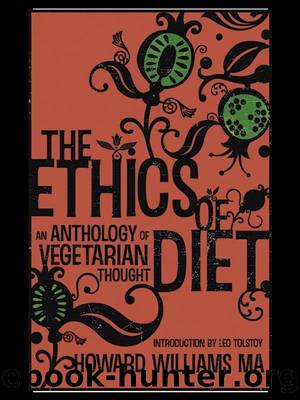The Ethics of Diet by Howard Williams

Author:Howard Williams [Williams, Howard]
Format: epub
Tags: White Crow Books, spirituality, religion, Leo Tolstoy, Howard Williams, diet, vegetarianism, ethics
ISBN: 9781907355721
Publisher: White Crow Productions Ltd
Published: 2010-01-18T23:00:00+00:00
CHAPTER 18
Pierre Gassendi and the Scientific Basis of the Humane Diet
1592â1655
Upon the reasons of ethics and of refinement of life the philosophy of Dietetic reform had been firmly established by a succession of thinkers from the earliest period of Hellenic history. It was not until the seventeenth century that it may be said to have been first founded on a thoroughly scientific no less than on a moral basis; and it is to the most humane philosophic thinker, and one of the most eminent men, of that period; the author of the Life and Morals of Epicurus is due the high honour of having been the first directly to revive, in modern times, the dietetic philosophy on that sure foundation.
Although of extraordinary erudition, the learning of the scholar did not, as so often happens, obscure the powers of original thought and reason. Bayle, writing at the end of the seventeenth century, has characterized him as âthe greatest philosopher among scholars, and the greatest scholar among philosophers;â and Newton conceived the same high esteem for the great vindicator of Epicurus.
It is in his celebrated letter to his friend Van Helmont that Gassendi deals with the irrational assertions of certain physiologists, apparently more devoted to the defence of the orthodox diet than to the discovery of unwelcome truth, as to the character of the human teeth:
âI was contending,â he writes to his medical friend, âthat from the conformation of our teeth we do not appear to be adapted by Nature to the use of a flesh diet, since all animals (I spoke of the terrestrials) whom Nature has formed to feed on flesh have their teeth long, conical, sharp, uneven, and with intervals between them â of which kind are lions, tigers, wolves, dogs, cats, and others. But those who are made to subsist only on herbs and fruit have their teeth short, broad, blunt, close to one another, and distributed in even rows. Of this sort are horses, cows, deer, sheep, goats, and some others. And further, that men have received from Nature, teeth which are unlike those of the first class, and resemble those of the second. It is therefore probable; since men are land-animals that Nature intended them to follow, in the selection of their food, not the carnivorous tribes, but those races of animals which are contented with the simple productions of the earth.
Wherefore, I here repeat that from the primeval institution of our nature, the teeth were destined to the mastication, not of flesh, but of fruits.
As for flesh, true, indeed, is it that man is sustained on flesh. But how many things, let me ask, does man do every day, which are contrary to, or beside, his nature? So great, and so general, is the perversion of his mode of life, which has, as it were, eaten into his flesh by a sort of deadly contagion (contagione veluti quidam jam inusta est), that he appears to have put on another disposition. Hence, the whole care and
Download
This site does not store any files on its server. We only index and link to content provided by other sites. Please contact the content providers to delete copyright contents if any and email us, we'll remove relevant links or contents immediately.
Machine Learning at Scale with H2O by Gregory Keys | David Whiting(4313)
Never by Ken Follett(3957)
Harry Potter and the Goblet Of Fire by J.K. Rowling(3860)
Fairy Tale by Stephen King(3399)
Unfinished: A Memoir by Priyanka Chopra Jonas(3391)
The Man Who Died Twice by Richard Osman(3081)
Will by Will Smith(2921)
It Starts With Us (It Ends with Us #2) by Colleen Hoover(2368)
Rationality by Steven Pinker(2366)
Can't Hurt Me: Master Your Mind and Defy the Odds - Clean Edition by David Goggins(2342)
The Dark Hours by Michael Connelly(2311)
The Storyteller by Dave Grohl(2238)
Friends, Lovers, and the Big Terrible Thing by Matthew Perry(2230)
The Dawn of Everything: A New History of Humanity by David Graeber & David Wengrow(2210)
The Becoming by Nora Roberts(2204)
The Stranger in the Lifeboat by Mitch Albom(2123)
Cloud Cuckoo Land by Anthony Doerr(2114)
Love on the Brain by Ali Hazelwood(2078)
Einstein: His Life and Universe by Walter Isaacson(2026)
